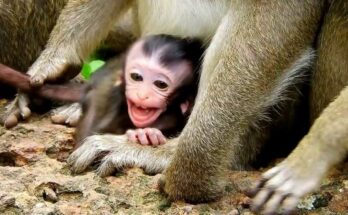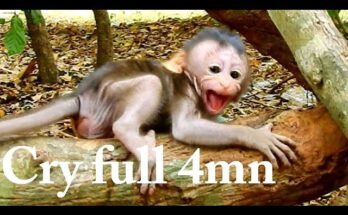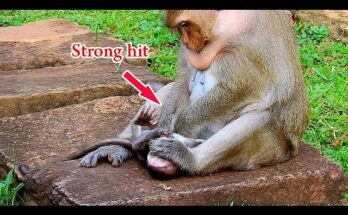In the stillness of early morning, deep in the heart of the jungle, a tiny cry cuts through the rustling leaves and birdsong. It is the voice of a newborn baby monkey—barely a day old, eyes still adjusting to the world, body trembling with weakness. This little one was born just yesterday, but instead of being nestled in the warmth of a loving embrace, it is already facing the cold, harsh reality of survival. Its mother, young and unsure, has refused to feed it.
The baby lies curled on the ground near a tree root, barely strong enough to lift its head. It cries—soft at first, then louder, more desperate with each passing minute. Its cries are not just for attention—they are cries of hunger, confusion, and need. The mother sits just a few steps away, watching, but not responding with the love and comfort the baby so desperately needs.
She had given birth only the day before, but something in her instinct didn’t fully connect. Perhaps she’s too young, too frightened, or simply overwhelmed. Instead of drawing the baby close to nurse and groom it like other mothers in the troop, she has remained distant, unsure of what to do. Her eyes flicker between her baby and the rest of the group as if torn between natural instinct and rejection.
The troop moves slowly through the trees, many other mothers carrying their young close, nursing them gently while foraging. But this one newborn has no such comfort. Its body is too weak to crawl far, and every moment without nourishment grows more dangerous.
Several adult monkeys glance over, curious about the crying. A few even approach, sniffing at the helpless baby on the forest floor. But they move on. In the wild, survival often depends on the mother’s commitment—and when that bond is broken, others rarely interfere.
As the sun rises higher and the jungle warms, the baby’s cries grow louder and more painful. It lifts its head, shaking, and looks around for its mother. It tries to crawl toward her, dragging its frail body across the earth, crying out with every move. But when it reaches her side and attempts to nuzzle in for milk, she shifts away, avoiding the baby’s tiny grasp.
The rejection is quiet but final. The baby lets out another heartbreaking wail—a sound so small, yet so full of sorrow.
As the day stretches on, the baby becomes quieter, exhaustion setting in. Its cries become soft whimpers. Still, it doesn’t give up. It curls into a small ball near its mother, hoping that she might change her mind, that she might remember the bond they shared for just one day.
This is the silent suffering of life in the wild—where not every baby is welcomed, and not every mother is ready. The newborn’s cries are fading, but the hope remains. Even in the absence of care, the will to live is strong, and this little one still waits for love that may yet come.


